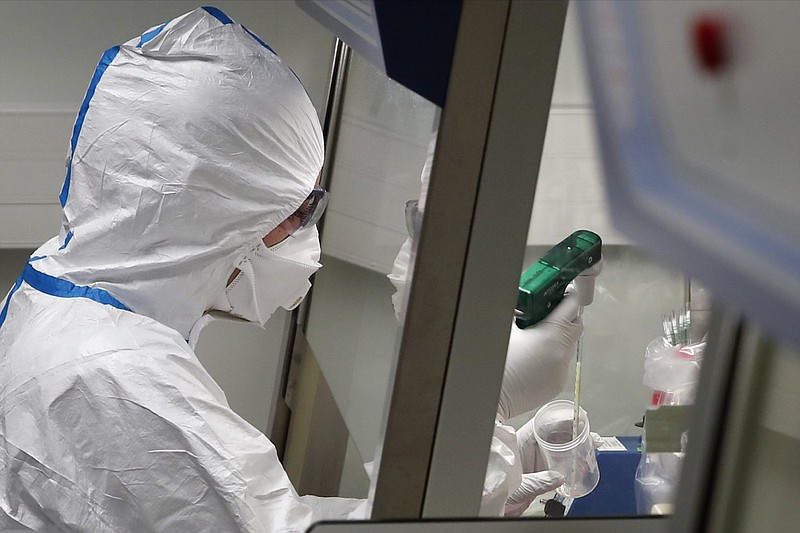Will the new coronavirus now ravaging China ever go away? Or is it here to stay, causing ongoing misery?
The answer depends on two possible outcomes: China, the epicenter of the outbreak, gets the virus under control -- or it doesn't, and permanent new epicenters of infection spring up in poorer, more desperate nations.
Time is of the essence, according to leading infectious disease experts. Since the virus was first identified in December, the number of casualties in China has skyrocketed, with more than 37,000 cases and 800 deaths, surpassing SARS fatalities in 2003, according to Chinese health officials. While the rest of the globe has effectively isolated the world's most populous nation, such extreme measures can't go on forever.
Then this coronavirus could join the many other viruses, such as chickenpox, the flu and common cold, which forever circulate the globe, seasonally waxing and waning -- until medicines or vaccines save the day.
"Once you get critical mass, it is very hard for tried and true public health approaches to make an impact," said Dr. Robert R. Redfield, director of the U.S. Centers for Disease Control and Prevention.
So far, there's no containment in China. But -- here's the good news -- the spread of coronavirus outside China remains somewhat limited, with individual or small clusters of cases. Blocked travel, strict surveillance, aggressive quarantines and global coordination have protected us.
So far, 27 nations have caught the explosive virus before it ignited into a larger outbreak. Of these, 13 detected it in an individual traveler to China. Another 14 nations stopped it right after it made a dangerous jump -- from a Chinese traveler to others.
Yet if just one country lets the tiny microbe gain a foothold in the general community, and lacks the resources to stop its spread, the rest of us will continue to be at risk, say experts. Global health security is only as strong as the world's weakest link.
Under the most optimistic scenario, the virus is controlled and then eradicated in China.
There's precedent for that. In 2003, a cousin virus called Severe Acute Respiratory Syndrome, or SARS, emerged in China without warning, killing nearly 800 people.
"Since then, it has disappeared," said Jan Carette, associate professor of microbiology and immunology at Stanford University.
If control measures are eventually effective in China, and transmission slows so that each infected person infects no more than one other person, the current outbreak could simply dwindle, then vanish, said Carette.
But that depends on several factors, still unknown. How easily does the virus spread? How sick does it make people? Can infected people with no symptoms infect others?
There is troubling new evidence that some infected people don't feel sick, so they may unwittingly infect others, said the CDC's Redfield. There also are hints that the virus can be transmitted before symptoms start, he said. So this virus may not behave like SARS. People with SARS got so sick that they immediately went to bed or sought care, limiting its spread.
This outbreak has strained China's health care system, which is stretched even in normal times.
"In China, it's beyond containment," the CDC's Redfield said on Friday. "We're trying to prevent a second China now."
Fighting the disease at its source could reduce the risk of spread, according to World Health Organization Director-General Tedros Adhanom Ghebreyesus. That approach worked with Ebola, where deaths were geographically confined.
"Focus on the epicenter," Tedros said at a recent news conference. "If you have several epicenters, it is chaos."
The second possible scenario is far less optimistic: The virus remains uncontrolled in China and becomes rooted elsewhere, where it persists, seeding the rest of the globe.
Epidemiologists call this an "endemic" virus, circulating continuously with seasonal fluctuations.
Chickenpox and influenza are endemic in many countries. So are four other coronaviruses -- 229E, OC43, KHU1 and NL63 -- which are responsible for an estimated one-quarter of all colds and can cause more severe disease, such as pneumonia, in children and the elderly.
So far, strict vigilance has kept Americans safe. Only 12 cases have been reported, as of Sunday, and the virus has not spread into the broader community.
But isolation, quarantines and travel bans aren't sustainable, said biology professor Frederick Cohan of Wesleyan University, who studies the evolution of microbes.
"I don't know of any realistic scenario where you could have a virus that is raging in one major geographic area and not present in other ones. That's not what will happen," he said. "We're not able to clamp down on every visitor for an extended period of time.
"Either it will spread worldwide or it will disappear," he said.
Based on what he has seen so far, Dr. Amesh Adalja, an infectious disease specialist at the Johns Hopkins Center for Health Security, thinks it's probably too late to contain the virus.
"As we see more and more cases -- and the severity falls, as we diagnose better -- it is time to start thinking about not how to contain it but to cope with it, and repurpose our health care facilities," said Adalja.
How much death and disease would it cause? No one knows. There's the chance it could mutate so that it is more benign, with symptoms such as the common cold or a mild flu. Then its presence would be less worrisome. It might also have seasonal shifts, worsening in winter when people are clustered together.
